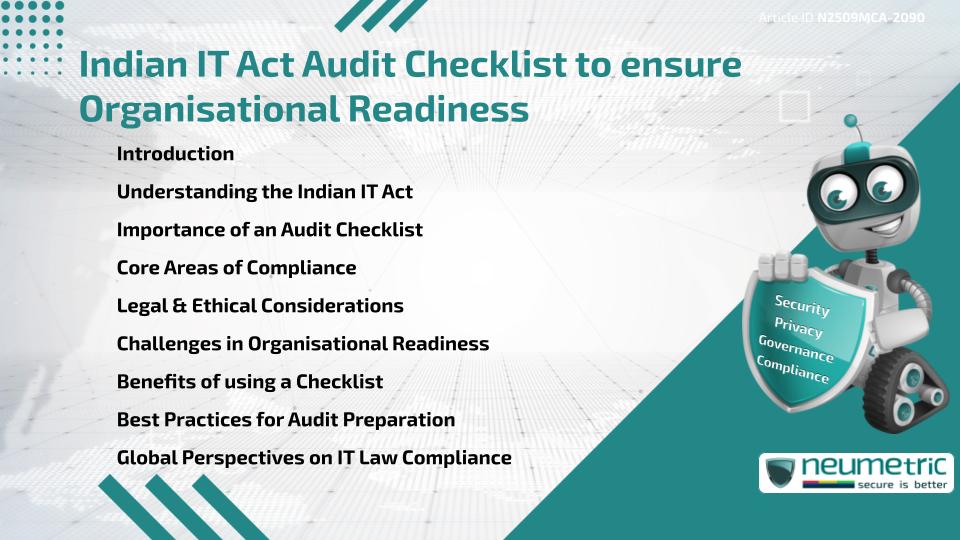Table of Contents
ToggleIntroduction
The Indian IT Act Audit checklist is a practical tool for businesses seeking to ensure compliance with the Information Technology Act, 2000 & its amendments. This law governs electronic transactions, Cybersecurity & Data Protection in India. Organisations that use digital platforms or store Personal Information must meet compliance obligations to avoid penalties & protect User trust. This article outlines the significance of the checklist, explains compliance areas, highlights challenges & provides Best Practices to ensure organisational readiness.
Understanding the Indian IT Act
The Information Technology Act, 2000, also known as the IT Act, was introduced to provide a legal Framework for electronic records, digital signatures & Cybersecurity in India. It has since been amended to address emerging issues such as identity theft, cyber fraud & data breaches. The law applies to all organisations that operate online, manage Sensitive Information or provide technology-based services.
The Indian IT Act Audit checklist helps organisations translate these broad legal provisions into practical steps for compliance.
Importance of an Audit Checklist
An Audit checklist serves as a roadmap for compliance. Without it, organisations Risk overlooking critical requirements. The Indian IT Act Audit checklist simplifies complex legal obligations into actionable tasks, ensuring:
- Systematic review of IT processes
- Identification of gaps in compliance
- Efficient allocation of resources
- Improved accountability across departments
By using a checklist, organisations can prepare for audits & inspections with confidence.
Core Areas of Compliance
The Indian IT Act Audit checklist covers several essential areas:
- Data Protection & Privacy measures
- Information Security Policies & procedures
- Use of digital signatures for authentication
- Cybercrime reporting mechanisms
- Secure storage & transmission of electronic records
- Incident Response & Business Continuity planning
Each area requires regular review to ensure compliance with both legal & technical requirements.
Legal & Ethical Considerations
While the IT Act mandates compliance, organisations must also consider ethical responsibilities. Protecting Customer Data goes beyond legal requirements; it builds trust & safeguards reputation. Ethical issues arise when organisations collect more data than necessary, fail to secure it properly or use it without consent. Addressing these issues alongside compliance ensures a balanced approach.
Challenges in Organisational Readiness
Achieving readiness is not without challenges. Common issues include:
- Limited awareness of IT Act provisions among Employees
- High costs of implementing Cybersecurity measures
- Rapidly evolving Cyber Threats
- Difficulty in balancing compliance with operational efficiency
Overcoming these challenges requires a combination of training, investment & strategic planning.
Benefits of using a Checklist
Despite challenges, using the Indian IT Act Audit checklist provides clear benefits:
- Enhanced legal protection from fines & penalties
- Increased confidence during regulatory audits
- Stronger Cybersecurity posture
- Greater Customer Trust through Transparency & Accountability
By adopting a checklist-driven approach, organisations align compliance with long-term growth.
Best Practices for Audit Preparation
To get the most from the checklist, organisations should:
- Develop comprehensive IT & Data Security Policies
- Conduct regular Employee Training sessions
- Use encryption & secure authentication methods
- Document compliance processes for easy review
- Perform periodic internal audits to identify gaps
These Best Practices ensure that compliance is proactive rather than reactive.
Global Perspectives on IT Law Compliance
India’s IT Act shares similarities with global frameworks such as the European Union’s General Data Protection Regulation [GDPR] and the United States’ Computer Fraud & Abuse Act. However, it is uniquely adapted to India’s digital landscape, focusing on electronic transactions & Cybersecurity. Understanding these global perspectives helps multinational organisations maintain consistent compliance across jurisdictions.
Takeaways
- The Indian IT Act Audit checklist is essential for organisations to achieve readiness
- It covers Data Protection, Cybersecurity & digital authentication measures
- Ethical responsibilities extend beyond legal compliance
- Challenges include costs, awareness & evolving cyber Risks
- Best Practices include training, encryption & internal audits
FAQ
What is the Indian IT Act?
A law which was passed in 2000 to provide legal recognition to electronic records, digital signatures & address cybercrime in India.
Why is the Indian IT Act Audit checklist important?
It simplifies Compliance Requirements into actionable steps, making it easier for organisations to prepare for audits.
Who must comply with the Indian IT Act?
All businesses & organisations that operate online, handle electronic records or process Personal Information must comply.
What areas does the checklist cover?
It includes Data Protection, Security Policies, digital signatures, cybercrime reporting & Business Continuity planning.
What challenges do organisations face in compliance?
Common challenges include costs of implementation, lack of awareness & constantly evolving Cyber Threats.
How can organisations prepare effectively?
They can prepare by training staff, using encryption, documenting compliance efforts & conducting internal audits.
How does the IT Act compare to Global Laws?
It aligns with Global Laws on Cybersecurity & Data Protection but is uniquely tailored to India’s regulatory environment.
Need help for Security, Privacy, Governance & VAPT?
Neumetric provides organisations the necessary help to achieve their Cybersecurity, Compliance, Governance, Privacy, Certifications & Pentesting needs.
Organisations & Businesses, specifically those which provide SaaS & AI Solutions in the Fintech, BFSI & other regulated sectors, usually need a Cybersecurity Partner for meeting & maintaining the ongoing Security & Privacy needs & requirements of their Enterprise Clients & Privacy conscious Customers.
SOC 2, ISO 27001, ISO 42001, NIST, HIPAA, HECVAT, EU GDPR are some of the Frameworks that are served by Fusion – a SaaS, multimodular, multitenant, centralised, automated, Cybersecurity & Compliance Management system.
Neumetric also provides Expert Services for technical security which covers VAPT for Web Applications, APIs, iOS & Android Mobile Apps, Security Testing for AWS & other Cloud Environments & Cloud Infrastructure & other similar scopes.
Reach out to us by Email or filling out the Contact Form…


